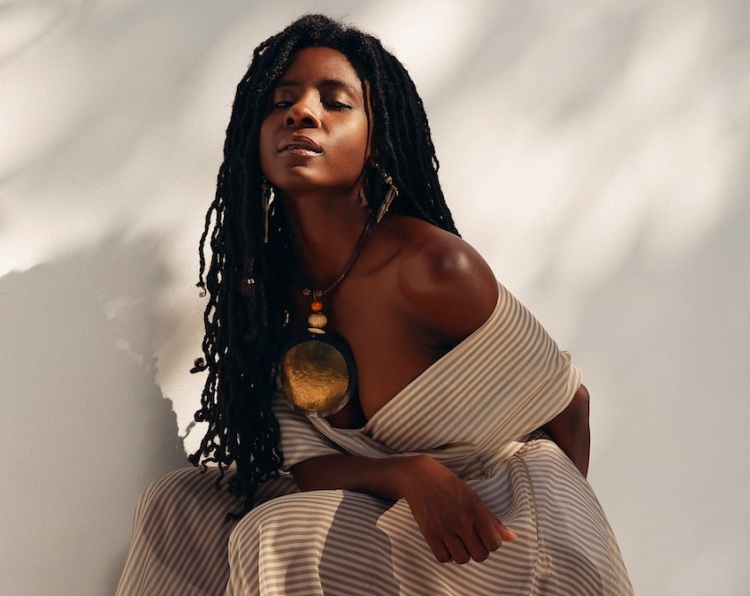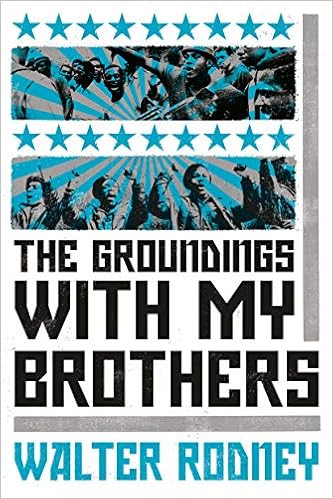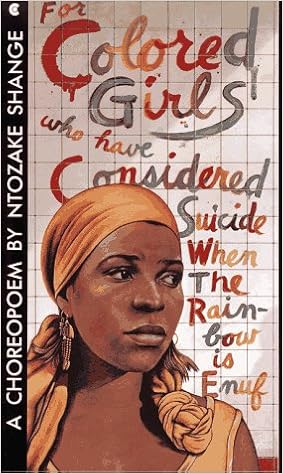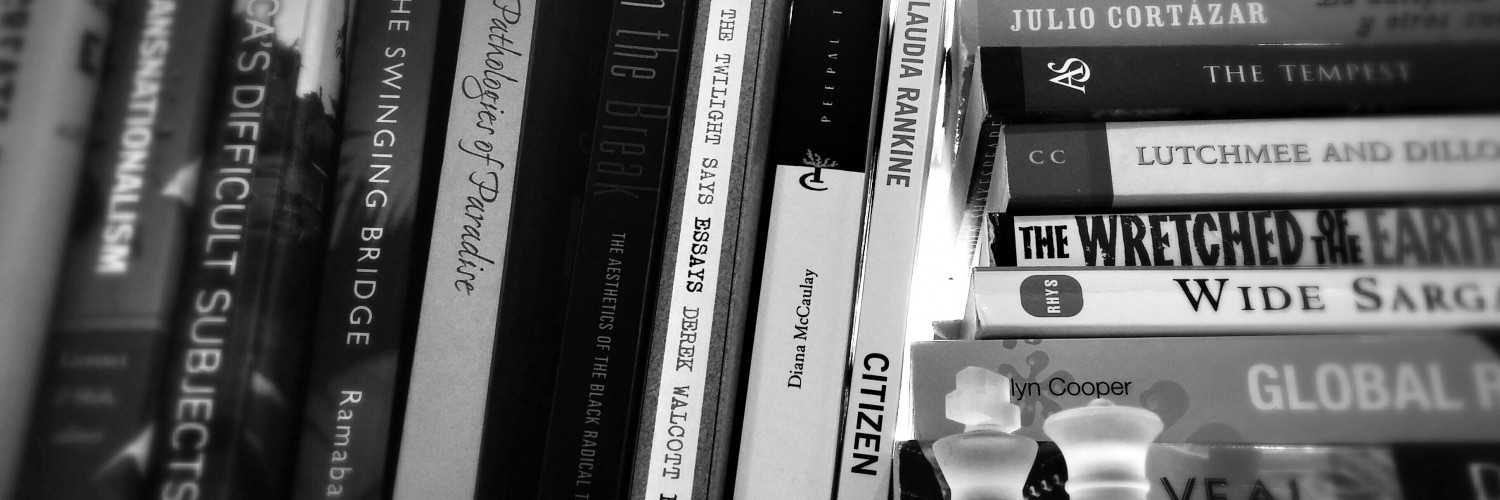In my field of literary study, we catalog texts by first close reading, then assessing, then writing. And when the music requires it — because the music is just too good to keep quiet — we apply the same process to the sonic. When I first listened to Jah9’s latest text, her album titled Note to Self, I was pulled in by the instrumentation, piqued by the lyrics, compelled to assess, and now what I offer to you is writing. So, no, this is not a review. It is a musical close reading of a deep listening that dives in via the dub space, jazz riffs, blues pain, and hip-hop-nyabinghi-reggae bass of a project that is worthy of critical annotation. The words that follow are annotations for the fellow deep listener who is ready to enter Jah9’s third studio album on a critical level.

With the big shift away from the physical music of vinyl, cds, and cassettes, our music listening has become as shallow and as scattered as our limited digital attention spans. We skip through tracks like we scroll through Instagram or Twitter, but when we do this, we do a disservice to the artists who spend months — sometimes years — choosing notes, pruning melodies, and carefully curating albums of intention. Too many of us choose the single life of one-track-and-gone listening over the monogamous full-album commitment to partner with an artist from the first note to their last track’s fade out. Many of us are unwilling to practice musical patience, unwilling to stick with an album through good songs and the potential for bad ones. We only want the big tracks, the most popular and well-streamed hits. As a result, many of us are missing out on some of the soul-stirring material that tells the artist’s story and builds and moves an album’s plot forward. From my own experience with classic dub and soul music in particular, I have learned that there is great sonic pleasure to be found when one avoids engaging in musical flings. One-track-stands do nothing for us as listeners. And in these days of mounting anxiety, deep listening to a full album can bring an hour or more of reflective focus, which can be just the antidote that we need to steady our racing minds.
You see, listening to music is as psychological as it is a source of entertainment. Ask any producer and they may confess to you that they know exactly what tempos and tones can induce you to throw your hands up and which rhythms can make you drop to your knees in worship. They know what patterns can Jedi-mind-trick you out of one mood and into another, lift you from this moment, from this world, transport you back, forth, or simply take you away from your present reality. Imagine now, what kind of experience can develop when a social scientist who is also a yogi enters the music studio. What kind of grounding can the listener expect when the rooted drum beats along to our hearts’ rhythm? What kind of mental acuity can the listener expect when the horns are so attentively calling us to order and the dub reverb gives us space to wonder and wander safely? What kind of buoyancy can the listener expect when the bass walks with such a cheerful gait?
When Note to Self was released on March 13, 2020, for many, it became a ready-guide for how to survive the fear and anxiety associated with the COVID-19 pandemic. And while I could write pages heralding what Note to Self induces in me as a listener, I would much rather that you annotate your own experience with the music. What I will do, though, is take you briefly to some of the musical, theoretical, and literary places that Note to Self took me. For example, listening to this album engendered a moment of plausible imagining that took me on a safari into the Jill Scott meets Fela Kuti meets George Clinton mindscape of the Afro-futurist track “Field Trip.” I confronted the familiar unfamiliar of the 1977 Rose Royce “Ooh Boy (I Love You So)” melody floating under the “You and I” duet with Pressure Busspipe. And there was another then-meets-now-Sankofa experience that surfaced in Jah9’s hip hop poeticism on the Akala-featured “New Race (A Way)”. This track hit my ears with the focused intelligence of 90s classics like Queen Latifah’s “U.N.I.T.Y.” or Mobb Deep’s “Survival of the Fittest” or the more contemporary considerations of a rapper like J. Cole on “Middle Child.” What I am getting at here, is that the 15 tracks (interludes included) of Note to Self bring together Black-born musical genres with an ease that unites the African diaspora in a sonic gathering of distinct race deference. This coming together of genres is, for me, something akin to Booker T. Washington’s famous 1895 words: “In all things that are purely social we can be as separate as the fingers, yet one as the hand in all things essential to mutual progress.” So, while this album is Jah9’s note to herself, it also becomes an undeniable rallying cry for the race to shed the miseducation and see “a way over, a way out” of oppression, as voiced on “New Race.” Sitting still in my deep listening, taking in the chords of the bass and the call of the African drums, I greedily imagined an extended remix of this song. I imagined a dub mix that brought together the poetic perspectives of Runkus, Little Simz, Burna Boy, Popcaan, and Kendrick Lamar, each adding their own lyrics to and for the “New Race.”

Almost half-way through deeply listening to Note to Self, my mind was open and led to recall the words of Walter Rodney. In his 1969 work, the Guyanese activist-lecturer Walter Rodney transcribed his experience of grounding (connecting spiritually) with his Jamaican brothers. “As I speak,” said Rodney, “I would like to feel perhaps that what I am saying in one form or another will reach the brothers and therefore it is a message both to you and to them. And above all, I would like to indicate my own gratification for that experience which I shared with them.

Because I learnt. I got knowledge from them, real knowledge. You have to speak to Jamaican Rasta, and you have to listen to him, listen very carefully and then you will hear him tell you about the Word. And when you listen to him, and you can go back and read Muntu, an academic text, and read about Nomo, an African concept for Word, and you say, Goodness the Rasta know this, they knew this before Janheinz Jahn. You have to listen to them and you hear them talk about Cosmic Power and it rings a bell. I say, but I have read somewhere, this is Africa. You have to listen to their drums to get the Message of the Cosmic Power” (67). In her own way, and with carefully selected collaborations, I find that “Highly”, “Love Has Found I”, “Ready to Play” featuring Tarrus Riley, and the interlude “The Reflection”, reveal Note to Self as a kind of musical grounding with the brothers and the sisters of today. But just as Rodney’s words did and still do, I wonder how the words on this album will both inspire and challenge the brothers and sisters. Does music or art of any kind always find its audience?

My mind continued to stretch and recall and make connections between these tracks and other texts. Songs like “Note to Self (Okay)” featuring Chronixx and “Hey You” are voiced in the first-person, which gives listeners a look into the hinterlands of Jah9’s shielded spaces. But the self is not limited to the “I”, as heard on the perfectly positioned penultimate track, the blues rock song “Could It Be.” Here even the third-person is shown to be a voice of the self (both the singer’s and the listener’s). In this introspective way, I couldn’t help but recall the final scene of Ntozake Shange’s 1975 choreopoem For Colored Girls when the rainbow of women characters step forward to help lady in red to find what she was (and they were all) missing. *SPOILER ALERT* These are the final words lady in red says as she takes the audience on her journey:
“i sat up one nite walkin a boardin house
screamin/ cryin/ the ghost of another woman
who waz missin what i waz missin
i wanted to jump up outta my bones
& be done wit myself
leave me alone
& go on in the wind
it waz too much
i fell into a numbness
til the only tree i cd see
took me up in her branches
held me in the breeze
made me dawn dew
that chill at daybreak
the sun wrapped me up swingin rose light everywhere
the sky laid over me like a million men
i waz cold/ i waz burnin up/ a child
& endlessly weavin garments for the moon
wit my tears
i found god in myself
& i loved her/ i loved her fiercely
Shange’s choreopoem was and still is one of the most influential texts and performances for or about being black and being a woman. So too is this Note to Self album asserting itself with an equally powerful intention and confidence.

All of that said, it must not go un-noted and it must not be discounted that Shange’s For Colored Girls Who Have Considered Suicide/ When the Rainbow is Enuf is about the pain and fear and loss that black women are denied the space to feel outwardly. That was then, in the 1970s. But still, popular music culture over the last twenty years has glorified coping and concealing over confronting and healing. Thankfully, this is starting to change in response to mental health initiatives of inclusion. But, getting back to the brothers (and the sisters) that Rodney grounds with in the dark, forgotten, and overlooked spaces, will Note to Self reach those who are in quiet pain? The Note to Self deep listener will find that this album experience casts light into the shaded corners, leaving no space to hide. It creates spaces to confront the self and restore feeling to those who have fallen “into numbness” as Shange’s lady in red did.
Perhaps not surprisingly, this annotation will conclude now with the closing track of the album. In the final minute of the album, in the coda that is titled “The Beginning,” Jah9 plays poetically with the definition of diaspora as she states these words: “To cast the seeds of my imagination and know with certainty that fruit is on the way….” Her words are full of knowing, perhaps because they echo with the knowing of more than four hundred years of survival in the diaspora. There is something natural and mystical in her words. These, like all of the lyrics voiced on Note to Self, stem from the fleshy roots of the spiritual. And paired with the Afro-diasporic range of the album’s music production, Note to Self combs gently but firmly through the kinky knots of Black oppression and fear in order to elevate and free the mind.
I have listened to Note to Self. I have listened to it without interruption, from start to finish. And I’ve listened deeply, very deeply. I have written my annotation. It is time now for you to listen or listen again. Feel where it takes you. Partner with this album. Listen deeply. Skip no tracks.

You preface this thought provoking piece by pointing out that “listening has become as shallow and as scattered as our limited digital attention spans”.
You are correct. But the signs are usually their to warn us at shallow swimming pools, “no diving”. I dare say that in addition to the “Parental Advisory” label, much of the Reggae offerings of the past two decades should also have a label “No Diving”. Jah9 has always been a thoughtful exception to the devolution. Her work is worthy of you analytical treatment.
I captured these from her launch 7 years ago.
LikeLike
Many thanks for your words and for the links. The no diving point is too true about a lot of music. Not every artist merits a deep listen.
LikeLiked by 1 person
You are absolutely right about that. Since Buju emerged on the conscious reggae scene some thirty years ago, Chronixx has been the last reggae artist that I’ve felt worthy of a “deep listen”, but even he couldn’t be as captivating as Jah9. Your annotation was exceptional as I have all your “teachings” that I am slowly getting around to reading. Keep at it my sista, you definitely have a listener in me.
LikeLike
Your ‘annotation’ is as usual read worthy. Deep.
On Sun, Mar 29, 2020, 12:40 PM write pon di riddim wrote:
> IsisSemajHall posted: “In my field of literary study, we catalog texts by > first close reading, then assessing, then writing. And when the music > requires it — because the music is just too good to keep quiet — we apply > the same process to the sonic. When I first listened to Ja” >
LikeLike